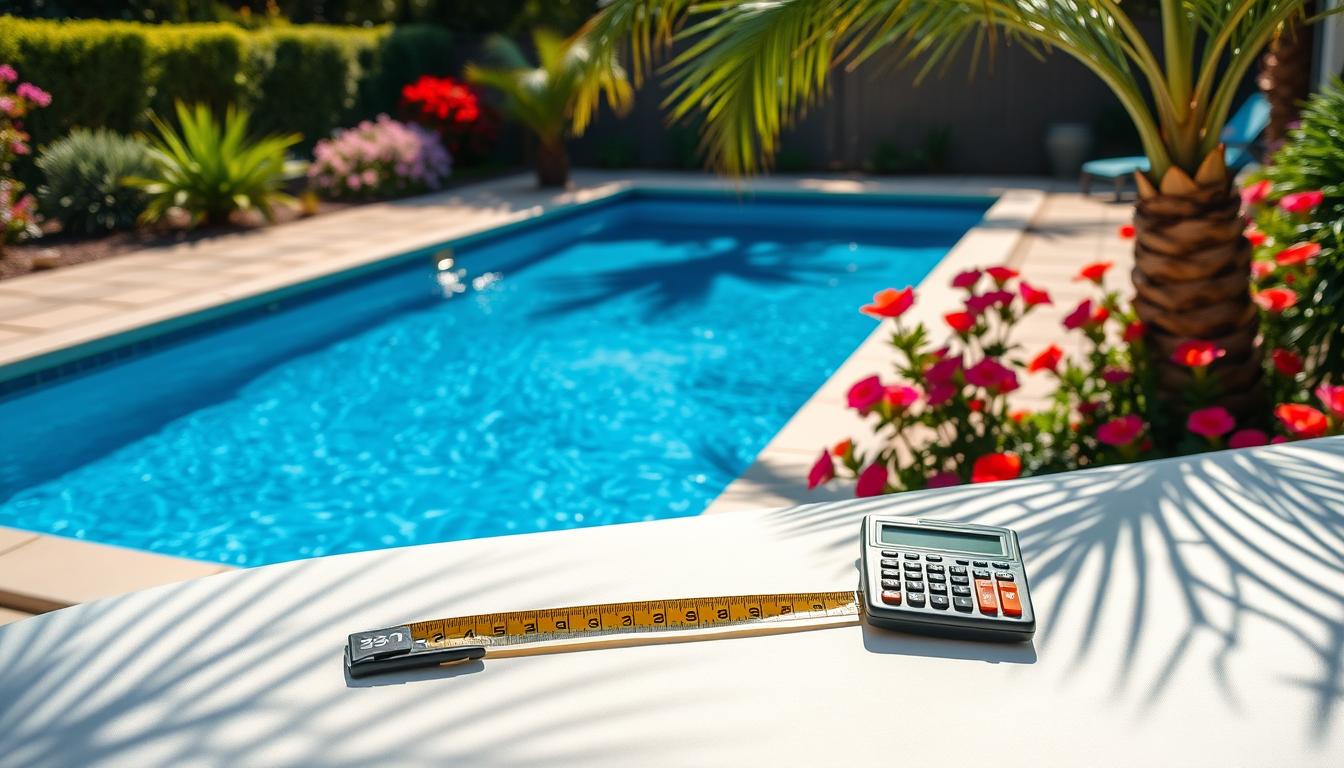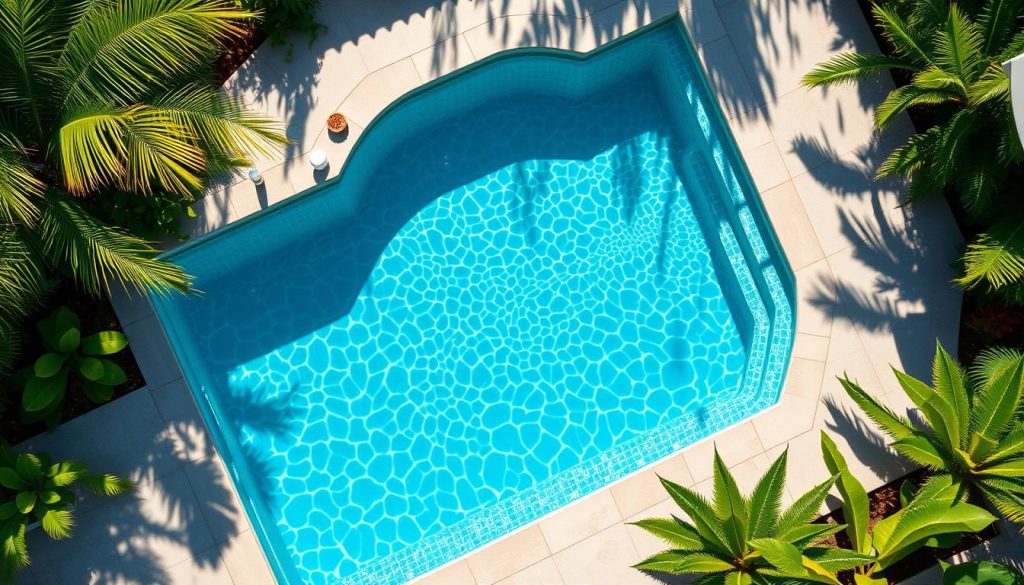
An Olympic-size swimming pool holds 660,000 US gallons of water. Your backyard pool is smaller, but knowing its volume is vital. This helps maintain proper chemical balance and clear water.
Wondering about the gallons in a 15×30 pool? Need to calculate your pool’s capacity? You’re in the right place.
To estimate your pool’s water quantity, you’ll need some key information. This includes your pool’s dimensions and average depth. Don’t worry if math isn’t your strong point.
We’ll guide you through the process step-by-step. You’ll be able to determine your pool’s volume with confidence. This will help you keep it in great condition all season.
Key Takeaways
- Knowing your pool’s water volume is essential for proper chemical dosing and maintenance
- Pool volume is calculated using the formula: Length x Width x Average Depth x Multiplier
- Multipliers vary based on pool shape: 7.5 for rectangular, square, or freeform pools; 5.9 for round or oval pools
- Average depth is determined by measuring the shallow and deep ends, then dividing the sum by two
- A 15×30 pool typically holds between 13,500 and 27,000 gallons, depending on its average depth
Understanding Pool Volume Calculations
Knowing your pool’s volume is key for proper water care and planning. You need to grasp the pool volume formula and how to use it. Let’s explore how to figure out your pool’s gallon count.
The formula takes into account your pool’s size and shape. Accurate measurements are crucial for correct calculations.
Pool Volume Formula
The pool volume formula is simple. It uses length, width, average depth, and a shape-based multiplier. Here’s the formula:
Length x Width x Average Depth x Multiplier = Pool Volume in Gallons
To use this formula, measure your pool carefully. Then, pick the right multiplier for your pool’s shape.
Determining the Multiplier
The multiplier in the formula changes based on your pool’s shape. Here are common pool shape multipliers:
| Pool Shape | Multiplier |
|---|---|
| Rectangular, Square, or Free-Form | 7.5 |
| Round or Oval | 5.9 |
Choose the right multiplier for your pool shape. For unique pools, ask a pro about the best multiplier.
Measuring Average Depth
To find average depth, measure the shallow and deep ends. Add these numbers and divide by two. For example:
(3 feet + 8 feet) ÷ 2 = 5.5 feet
If your pool has one depth, measure any spot. Exact depth measurements are vital for correct volume calculations.
Grasping the formula, choosing the right multiplier, and measuring accurately lets you calculate your pool’s volume. This knowledge helps maintain good water quality and plan water use.
With these skills, you can ensure a safe, fun swim for everyone. Your pool maintenance will be more effective and efficient.
Standard In-Ground Pool Volumes by Size
Pool size and water volume are crucial factors when installing an in-ground pool. Rectangular pools typically range from 10×20 to 20×40 feet. The average depth is 5.5 feet.
Pool size and depth affect water volume. This impacts costs for filling, maintaining, and treating the pool.
Common Rectangular Pool Sizes and Gallons
Here’s a chart showing water volumes for common rectangular pool sizes:
| Pool Size (ft) | Average Depth (ft) | Water Volume (gallons) |
|---|---|---|
| 12 x 24 | 4 | 10,800 |
| 14 x 28 | 4.5 | 14,000 |
| 15 x 30 | 4 | 13,500 |
| 15 x 30 | 5 | 16,900 |
| 16 x 32 | 5 | 19,200 |
| 18 x 36 | 5.5 | 24,300 |
| 20 x 40 | 5.5 | 30,000 |
Small changes in pool size can greatly affect water volume. A 15×30-foot pool with 4-foot depth holds 13,500 gallons. The same pool with 5-foot depth contains 16,900 gallons.
Using a Pool Volume Calculator
Pool size charts give a general idea of water volume. For accuracy, use a pool volume calculator. These online tools let you input exact dimensions.
Calculators offer options for various pool shapes. They provide precise results for rectangular, circular, or oval pools.
Using a calculator saves time and ensures accurate information. This helps with water chemistry and planning for fill-ups.
Knowing your pool’s volume is key for proper maintenance and treatment. Use size charts and calculators to make informed decisions. This ensures a well-maintained pool for years to come.
How Many Gallons is a 15×30 Pool?
The 15×30 pool gallons depend on the pool’s average depth. This pool size is popular among homeowners. The 15×30 pool volume varies based on depth.
To find the exact gallon count, measure both shallow and deep ends. Then, calculate the average depth. This helps determine the 15×30 pool capacity.

Let’s look at some common examples of 15×30 pool capacity for various depths:
| Average Depth | 15×30 Pool Gallons |
|---|---|
| 3.5 ft | 11,800 gallons |
| 4 ft | 13,500 gallons |
| 4.5 ft | 15,200 gallons |
| 5 ft | 16,900 gallons |
To calculate your exact 15×30 pool volume, follow these steps:
- Measure the depth of the shallow end and the deep end of your pool.
- Calculate the average depth by adding the shallow and deep end depths, then dividing by 2.
- Multiply the average depth by the pool’s length (30 ft), width (15 ft), and the appropriate multiplier for rectangular pools (7.5).
For example, if your 15×30 pool has a shallow end depth of 3 ft and a deep end depth of 6 ft, the average depth would be 4.5 ft. Using the formula, you would calculate: 4.5 ft x 30 ft x 15 ft x 7.5 = 15,187.5 gallons.
Knowing your 15×30 pool gallons helps with proper maintenance. It ensures correct chemical balance and energy efficiency. This knowledge is key for keeping your pool in top shape.
Above Ground Swimming Pool Water Volumes
Above ground pools come in various sizes, each with its own volume and capacity. Round pools range from 12 to 33 feet in diameter. Their water volume depends on the pool’s depth.
A 15-foot round pool with a 48-inch wall holds about 4,646 gallons. The same pool with a 52-inch wall contains 5,310 gallons. Oval pools, like the 15×30 foot size, typically hold between 9,293 and 10,620 gallons.
To calculate water volume accurately, use the right formula for your pool shape. For round and oval pools, multiply the dimensions by 5.9. This helps determine the precise volume of your above ground pool.
Pool capacity affects maintenance, chemical treatments, and water costs. Larger pools need more chemicals, filtering, and circulation to stay clean. Understanding pool sizes and gallons helps owners prepare for maintenance responsibilities.







